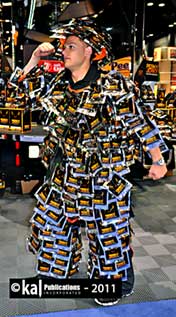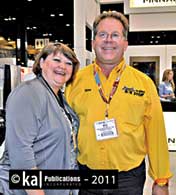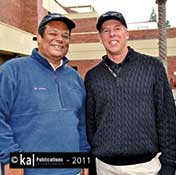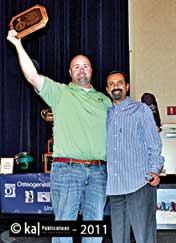
February 2012 Issue Highlights
For more complete coverage, send us an e-mail to
request a back
issue.

For more complete coverage, send us an e-mail to
request a back
issue.


National Association of Convenience Stores/Petroleum Equipment Institute Conventions and Trade Show


Southern California Petroleum Industry Golf and Tennis Tournament


Coast Oil/Robinson Oil Holiday Party
Want to see the photos that didn't make the issue? Check out the Cutting Room Floor.
ExxonMobil Creates New Combined Fuels, Lubes
Company
California Low Carbon Standard Blocked
Tesoro to Leave Hawaii Market
HollyFrontier To Expand Utah Refinery
Kinder Morgan To Purchase El Paso Corporation
Key Shopper Trends For 2012
IRVING, TX. — Exxon Mobil Corporation has begun the process of consolidating its fuels and lubricants business into ExxonMobil Fuels, Lubricants & Specialties Marketing Company.
The combination of the former ExxonMobil Fuels Marketing Company and the ExxonMobil Lubricants & Petroleum Specialties Company has been approved the by major oil company's Board of Directors, effective as of February 1, 2012.
The new ExxonMobil Lubricants & Petroleum Specialties Company will be headed by A. J. "Alan" Kelly, a 31-year veteran with ExxonMobil. Kelly had been serving as president of ExxonMobil Lubricants & Petroleum Specialties Company since 2007.
The downstream company will be headquartered in Fairfax, VA.
FRESNO, CA. — The California low carbon fuels standard (LCFS) has been temporarily blocked by the U.S. District Court.
According to a ruling, handed down by Judge Lawrence J. O'Neill of the U.S. District Court for the Eastern District of California at the end of December, the LCFS "violates the Commerce clause by unduly restricting interstate commerce." O'Neill found that the California regulations "showed prejudice" against biofuel and crude oil producers who were not based in California and "discriminates against out-of-state and foreign crude oil while giving an economic advantage to in-state crude oil."
The LCFS had been challenged by the Renewable Fuels Association and Growth Energy on behalf of the ethanol industry, which argued that the standard unfairly discriminated against corn-based ethanol produced outside of the state of California. The suit claimed that the LCFS violated the Commerce Clause of the U.S. Constitution by discriminating against out-of-state goods and seeks to regulate farming and fuel production practices in other states.
In the lawsuit, originally filed in 2009, the plaintiffs also claimed the LCFS imposed "excessive burdens" on the U.S. domestic ethanol industry while providing "no benefit" to Californians.
The petroleum industry had also argued against the LCFS, claiming that the standard "unfairly restricted out-of-state supplies of crude oil," according to Jay McKeeman of the California Independent Oil Marketers Association.
As part of his decision, O'Neill wrote that the California Air Resources Board, which wrote the fuel standard, "failed to establish that there are no alternative methods to advance its goals of reducing greenhouse gas emissions."
"The state of California overreached in creating its low carbon fuel standard by making it unconstitutionally punitive for farmers and ethanol producers outside of the state's borders," said a joint statement released by Bob Dinneen, RFA president and Tom Buis, Growth Energy CEO. The duo asked for California regulators to re-examine their LCFS and come up with a "thoughtful, fair, and ultimately achievable strategy for improving our environment by incenting the growth and evolution of American renewable fuels."
The State of California has announced that they will file an appeal with the 9th Circuit Court of Appeals and attempt to overturn the District Court's decision. They have also noted they will seek an order staying the preliminary injunction, but, "as long as the injunction remains in effect, ARB will respect the Court's ruling and withhold enforcement of the LCFS requirements."
SAN ANTONIO, TX. — Tesoro Corporation has announced that it plans to sell all of its Hawaii operations, including its Kapolei refinery, 32 retail stations and all assets related to those operations.
"Following a comprehensive analysis, we've determined that our business in Hawaii does not align with our strategic focus on the Mid-Continent and West Coast, and can provide greater value for a company that will invest in the business and employees," said Greg Goff, president and CEO of Tesoro, in an official statement, adding, "the Hawaii business is no longer in line with our vision for Tesoro's future."
Tesoro has been a major supplier to the Hawaii market for many years. The company's Kapolei refinery, the largest refinery in Hawaii, is "distillate-focused" and its pipeline supplies terminals at the Honolulu International Airport, the Honolulu Harbor, and for the United States military services.
Tesoro reported has approximately 550 employees in the Hawaiian Islands. The company operates service stations in Kailua, Kihei, Honolulu, Hilo, Kahului, Haleiwa, Kealakekua, Waiane, Kapolei, Ewa Beach, Pearl City, Waipahu, Mililani, and Aiea.
The oil company says it will continue to meet "all of its business commitments during the marketing and sales process."
According to industry analysts, the Kapolei refinery has a capacity of 94,000 barrels per day but has been operating at under 70,000 bpd because of the expense of getting crude oil to supply the facility.
In spring 2010, a Tesoro executive told the Honolulu Advertiser that the company's Kapolei plant lost money in 2009 and had continued to lose money in early 2010. He also said Tesoro at that time was considering converting the Hawaii plant into a terminal, where fuel would be dispensed.
Tesoro Hawaii expects to complete the sale "no sooner than the second half of 2012," subject to regulatory and other approvals.
HOUSTON, TX. — HollyFrontier has announced plans to expand the capacity of its Wood's Cross refinery in Utah.
The refinery, which currently has a capacity of 31,000 barrels per day, will be expanded to 45,000 bpd over the next three years. The cost of the upgrade is estimated at $225 million.
Incremental yields from the Woods Cross expansion are expected to be about 60% gasoline and 40% diesel, HollyFrontier said.
HollyFrontier also reported that the refinery will be supplied by a new 10-year deal with Newfield Exploration, bringing 20,000 b/d to the expanding facility.
"The project to expand our Woods Cross refinery supported by the Newfield supply agreement will allow us to significantly increase earnings and production from Woods Cross," said Mike Jennings, HollyFrontier's president and CEO.
HOUSTON, TX. — Kinder Morgan, Inc. has announced that it will acquire natural gas pipeline company El Paso Corporation for approximately $38 billion in cash and the assumption of El Paso's debt. When the acquisition is complete, the combined company will operate the largest natural gas pipeline network in the United States, be the largest independent transporter of petroleum products in the United States, the largest transporter of CO2 in the United States and the largest independent terminal owner/operator in the United States, making Kinder Morgan the fourth largest energy company in North America with a value estimated at $94 billion.
When the purchase has closed, El Paso Corporation will become a subsidiary of Kinder Morgan, Inc. Kinder Morgan has announced that it intends to sell the exploration and production assets of El Paso Corporation. Kinder Morgan Chairman and CEO Richard D. Kinder will remain chairman and CEO of the combined entity. The parent company will be named Kinder Morgan, Inc. and its corporate headquarters will remain in Houston, Texas.
"This once in a lifetime transaction is a win-win opportunity for both companies," said Kinder. "The El Paso assets are primarily regulated interstate natural gas pipelines that produce substantial, stable cash flow and have access to key supply regions and major consuming markets. The natural gas pipeline systems of the two companies are very complementary, as they primarily serve different supply sources and markets in the United States. The transaction is expected to produce immediate shareholder value (upon closing) through strong cash flow accretion and offers significant future growth opportunities."
The purchase has been approved by each company's board of directors but still requires approval of both KMI and EP shareholders as well as government regulators.
The transaction is expected to close in the second quarter of 2012.
One of the most popular educational sessions at the recent National Association of Convenience Stores Convention was a presentation on "Key Shopper Trends for 2012" This standing-room-only session, led by David Portalatin, the executive director of Industry Analysis at the NPD Group, outlined some key concepts retailers can use as they plan for the coming year.
Don't Plan On the Economy Improving
"We have been tracking perceptions about this economy," said Portalatin. "It's not getting any better. It hasn't been getting better for the last couple of years and, in August, it turned sour."
He believes that "Consumers are resigned that this economy is the new modern normal." This means that even if the economy improves, he does not believe consumers are going to shift their buying habits back to the patterns of five or ten years ago. They will continue to make buying decisions that have now become habit in a down economy, so waiting for things to come 'back to normal.' is never going to happen. Business owners should not be waiting for an upturn.
"This is the reality you have to deal with."
Depend Less on Gasoline Sales
Portalatin noted that Americans are are driving 45 billion fewer miles annually since November 2007. That trend means less income to gasoline marketers and less income to convenience store owners as a class because it "is taking traffic directly out of the convenience store channel."
"Total customer traffic through convenience store is down 4.2%," he noted. "The ones getting hurt the most are the ones who depend the most on gasoline traffic. They have declined 7.1% in terms of traffic."
Most of the decline in driving miles is directly attributed to the increased cost of gasoline and decreased demand because of a slower economy and unemployment. When people don't have a job, they don't need to drive to work. That said, even when workers are able to go back to the job, they may rely more on public transportation, alternative fuels, or flex-fuel vehicles in coming years, keeping demand for fuel lower.
He stressed, "Find ways to lessen your dependence on gasoline as a traffic driver. "
Your Competition Is Everywhere
With lower consumer spending, businesses of every kind are looking to increase their income and this has led to an increase in "non-traditional" vendors selling gasoline or convenience store items.
"Through the second quarter, we're seeing 7.5 percent of convenience purchases being made through grocery store, mass retailers, dollar stores, and drug stores," noted Portalatin. "There is a blurring of the convenience channels. This is not happening by accident."
Portalatin encouraged convenience store operators to look at all the other retailers in their area where consumers could buy sodas, snacks and other traditional c-store goods. The Home Depot is now offering candy and snacks — in addition to fresh flowers. Electronics retailers like Best Buy and Fry's keep a huge selection of candy, popcorn, jerky, and other treats lining the checkout aisles. He asked retailers to be aware of what others are selling and make sure the pricing for the same items is, at least, in line with what the competition is charging and try and offer items that could not be found elsewhere in the neighborhood.
Stock the "Growing" Categories
Portalatin noted that there are convenience store categories "with increasing purchase incidence" and encouraged c-store owners to be aware of the trends and to make sure they are maximizing their potential dollars from the categories that consumers are looking for.
The number one growth category in convenience stores, according to his company's research, is non-alcoholic beverages. Over the past year, the sales of non-alcoholic beverages have grown by 1.6%.
"Coffee is, by far, the biggest gainer," he noted. Although virtually every convenience store offers coffee, "Are you doing everything you can? Are you differentiated in the market?"
He also noted that "Tea is doing very well and growing."
Other major growth areas are salty snacks: corn chips, pretzels, nuts and seeds. "They have strong afternoon day growth," he noted, "and sweet snacks: muffins and doughnuts, have a strong morning lift."
He also encouraged convenience store owners to stock "alternative snacks" — and that category is going to change from market to market.
Alternative snacks cover a wide range of products. In the beverage category, it can include energy drinks, sports drinks, juice, slushes. In the snack category, it can include granola, cheese curls, cookies, or snack cakes. Specialty "alternative" chips could run the gamut from those made from vegetables or fruit slices to unusually spiced chips — such as pickle-flavored or shrimp chips — or "flaming" spicy chips. Alternative candy favorites often include gummy worms or sour candies.
In determining what to stock, "Millennials are key here," he noted. "You have to be relevant to them or you won't do well in this category."
Use Loyalty Programs
Consumers are willing to sacrifice a little, especially in a convenience store where they know prices might be higher than at a discount store, but they do want a feeling of value. A very successful way to help consumers feel they are getting a value is by using a loyalty program.
Portalatin noted that their research found "a lot of people will go [to a specific retailer] because they have a reward card, a coupon, the perception of a deal or value.
"Alternative gasoline retailers are rewarding customers with discounts and driving traffic," he noted. "63% of grocery gasoline buyers say they bought gasoline because of a discount ot reward or loyalty card. This is working and they're taking market share."
Loyalty programs aren't just bringing in new customers, he reported — they also bring in more income by increasing the amount that customers purchase. The NPD research found that "People who say they chose their location because of or with a reward or loyalty card will spend 21% more in dollars and have 15% more items in their cart. They are motivated by the deal."
He continued, "Consumers are weary of the economy. They want to spend more and they want to get more. Consumers will buy something off the McDonald's dollar menu and then reward themselves with $2.79 smoothies."
Millennials Are Your Customers, Not Boomers
The Baby Boomer generation may plan on never getting old but, in terms of convenience store customers, they are yesterday's news. Millennials — who were born in the mid-1980s and the 1990s — are the generation that is now key to convenience store success.
"When the Baby Boomers were 18-34, they were the c-store drivers," explained Portalatin. "Some of these trends we see are life stage driven. Today, Millennials are 18-34."
He noted that the c-store traffic of millennials was 30% of total c-store traffic in the second quarter. Their share of traffic has increased 1% the past year and he expects that trend to continue.
So, what's important to know about Millennials?
"They have never lived in an environment where Walmart did not sell gasoline," said Portalain. "They don't have the feelings about gasoline brands that older generations do. They've also never lived in a world where you didn't buy your lunch in a convenience store. Use that to your advantage. They are more open to experimentation.
"They want choices and assortment. They will try almost anything and shop almost anywhere." With that said, he also noted that while Millennials are not loyal to specific stores or retail outlets, they will "latch onto a brand. If you create a brand that they want, you're set for life."
He also noted that "Millennials live by the smart phone. They do virtually everything on it. We're just starting to research this. They don't talk on the phone, either. If you want to reach a Millennial, a voice message won't work. But text them and you'll get an answer almost immediately." He added, "Facebook is yesterday's news for Millennials. It's a phenomenal tool for reaching moms now."
Portalatin also noted that although Millennials are the largest generation in terms of population, "it may not be the largest generation of drivers. You have to think about what that means. Kids that in a past generation might have had a job and bought a car are still driving around with their parents."
Reconsider a Restaurant
One area of tremendous growth potential for convenience stores is the quick serve restaurant. Consumers still want to eat out, even though the economy is bad, and a QSR has perceived value. For busy parents or stressed out workers, a c-store QSR gives an opportunity to pick up a quick meal while getting gasoline or running other errands. With the increase of food options and restaurant concepts available, the stereotype of having an old sandwich at a gas station is transforming into a positive place to pick up a meal to bring home or eat on-the-go.
"Convenience stores are one of the areas of fastest growth in the restaurant business," noted Portalatin. He also noted that a "drive-thru window is something consumers want. It is absolutely relevant to a certain population. It is an area where QSRs have a competitive advantage and, if you can, you should put one in."
Other Major Trends to Remember, according to Portalatin:
"Growth through your door is going to come, more and more, at the expense of your competitor.
"Sales for the total channel are up 2.1%. If you're up 2%, you're treading water.
"Right now, the fast serve restaurant outsells you 5 to 1 on fountain drinks. Learn their best practices.
"Consumers in generally may be passionate about the environment but when it come to purchase choices, they want value. They don't care about sustainability without the deal."
Originally published in the February 2012 issue of O&A Marketing
News.
Copyright 2012 by KAL Publications Inc.
Serving the 13 Western States, the World's Largest Gasoline, Oil, Fuel, TBA and Automotive Service Market